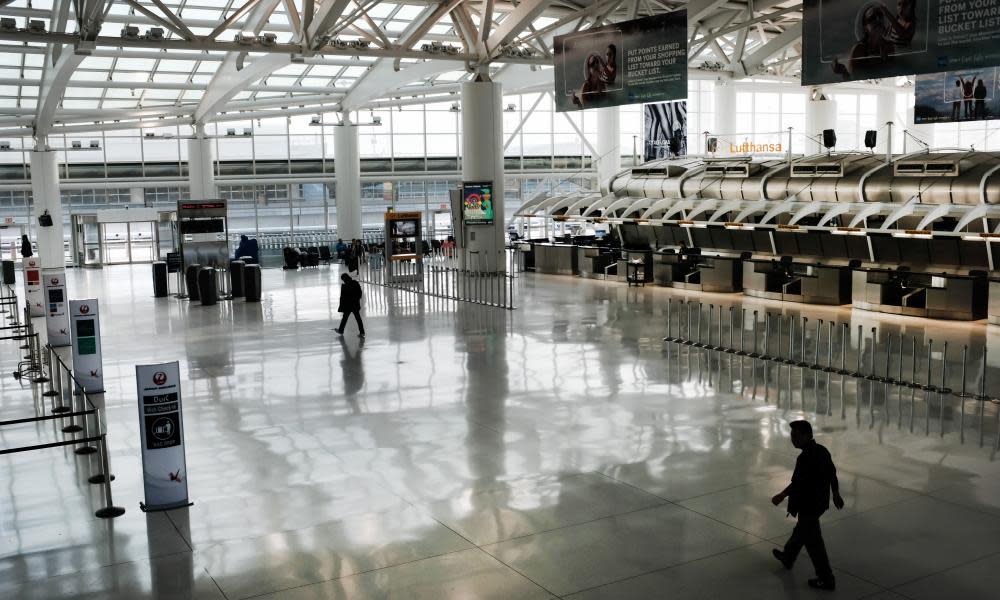US airports calm after Trump's coronavirus travel restrictions as Europe scrambles

Passengers at New York’s JFK airport waiting for flights to Europe experienced almost none of the chaos reported at European international airports, where some passengers have been paying exorbitant sums to get to the US ahead of tomorrow’s travel ban.
With a single Alitalia flight, from Rome, on the arrivals board at JFK’s terminal two, many passengers said they had decided to leave early and – without confirmations – hoped that they would be allowed to switch to a Europe-bound flight today, knowing that with inbound flights shutting down their chances of returning home beyond tomorrow are limited.
“I came to the airport a day early because I do not know how I will get home otherwise,” said Pasquale Fimiani, waiting for the Alitalia desk to open.
The Wednesday night sudden decision by Donald Trump to close down European flights, he said, seemed “very chaotic”.
“Frankly, I don’t think this is the best way to manage this situation,” Fimiani added. “There are many people like me – Europeans in America and Americans in Europe – who want to come back home.”
Returning to Italy, where millions are under restricted travel and home quarantine, Pasquale added, was preferable, despite New York life – at least judging by full restaurants and operating subways – remaining mostly uninterrupted.
“When I get home to Rome I will be under great restrictions, but I think the government is handling it,” Fimiani added.
Only foreign travelers to countries who have been in the Schengen area of Europe 14 days prior are affected by the new restrictions. US nationals are not affected, though disruption to trans-Atlantic flights is likely to impact US-bound travelers of all nationalities as airlines cut schedules.
Travel restrictions would not apply to those who had been in the UK, Trump clarified, and would begin on Friday 13 March at midnight and last for 30 days.
Micaela from Austria said she decided last night after Trump’s address to come directly to the airport to try and get home after being placed on a two-hour telephone hold by United. “It feels like it is just getting serious here now so decided to try to leave today. So I came here to see what flight I could take,” she said.
But on the way into the US, on 5 March, she encountered almost no screening checks. “They asked me if I’d been to China or Iran, but they didn’t ask me if I’d had any fever. I said no, and that was it. I expected much more.”
Jose Andres, hoping to fly home to Valencia, Spain, via Madrid, said the choice between staying in America, where testing for coronavirus is still sporadic, and being under the European system of healthcare was a relatively easy choice to make.
“Our system is better than here because everyone who has the virus is getting free healthcare,” Andres noted.
But with almost empty terminals, a smattering of airline staff in face-masks and generalized sense of foreboding, JFK seemed to be a ghost town compared to pre-coronavirus activity.
Curbside attendant Anthony Peart said his hours had already been cut down. “They says they will increase again when this coronavirus is over but who knows when that will be.”
An airport official, who declined to be identified, said Trump’s abrupt directive is not necessarily the last word in the fast-moving crisis.
“Saying something and enforcing it are two different things. So who knows? What’s he going to do? Force flights to stop? I think it’s a waiting game.”
But others traveling said they believed the decision was a prudent one, despite inconveniencing millions of travelers and helping to cause global stocks to take another precipitous plunge.
In Europe, thousands of travelers planning to travel to the US have been left scrambling after Trump issued the overnight order hours after the World Health Organization declared a global pandemic.
US-bound traveler Mike McIntire posted a photo on Twitter earlier today of the scene at Charles de Gaulle in Paris, France where thousands lined up to board US-bound flights.
“Bedlam at US-bound airlines at CDG in Paris early this am, as Americans pay as much as $20,000 for last-minute flights,” McIntire wrote.
In his statement, Trump said: “The European Union failed to take the same precautions and restrict travel from China and other hot spots. As a result, a large number of new clusters in the United States were seeded by travelers from Europe.”
He continued: “We made a lifesaving move with early action on China. Now we must take the same action with Europe.”
But at JFK, as travelers milled around hoping for news from airplane representatives, some said it was a good time to leave the US.
“You can’t get any masks, not even at the hardware or beauty-supply stores, and even bottles of hand-sanitizer is restricted to one per customer,” said Anna Nobokova-Henry, returning to Moscow.
The airport, she said, might be empty but remaining staff seemed on the verge of nonchalance. “Nothing is really happening here – I can’t see TSA or airport staff making any protective measures. People probably are scared but they don’t seem to be taking actions to protect themselves as seriously here.”

